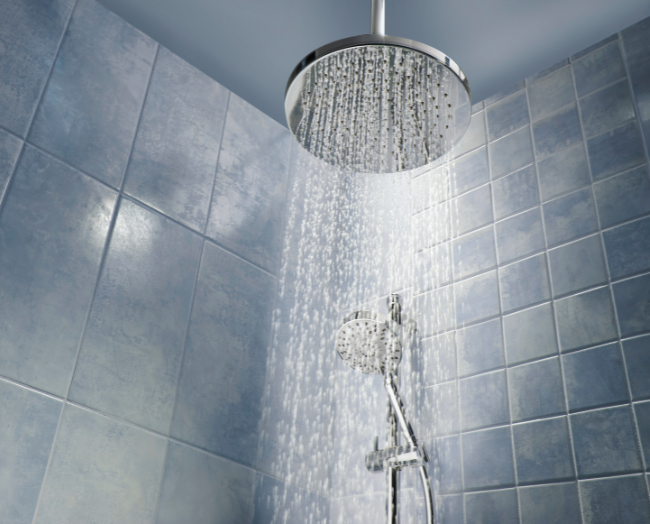Are you trying to figure out if you should crank the dial towards icy blasts or steamy warmth when you hop in the shower? You're definitely not alone. In this easy-to-follow guide, we're going to sort out the hot debate: cold showers vs. hot showers – and see which one might be the best pick for your daily rinse.
Benefits of Cold Showers

A cold shower is pretty much what it sounds like: showering in cold water, typically below 70°F (21°C). This chilly practice isn't just for the bold and the brave—it's got a cool list of perks. Here's why some folks are turning the temperature down:
- It kicks your circulation into high gear, helping your body work more efficiently.
- Swelling and soreness after exercise? A cold shower might help reduce that.
- It sharpens your mind, giving you a natural dose of energy and alertness.
- Cold showers are linked to better resistance to common illnesses.
Benefits of Hot Showers

A hot shower is a soothing escape that warms your body with water typically above 98°F (37°C). Beyond the cozy comfort, taking a hot shower can feel like a mini spa session and offers its own set of benefits
- It eases tight muscles, helping you unwind after a long day or a tough workout.
- The steam can clear your sinuses and respiratory passages.
- Warm water can be gentle on your skin, opening pores and cleansing impurities.
- Hot showers can promote better sleep, especially if taken before bed.
Key Differences Between Cold and Hot Showers
Choosing between a cold or hot shower isn't just a matter of preference—it's about the impact on your health, skin, energy, and even the environment. Both have their perks and points to consider. Let's quickly compare the two to help you decide which showering temperature might suit your needs best.
Health Benefits:
When it comes to skin and hair care, cold showers tend to be the gentler option. They can help to reduce the likelihood of dry skin by preserving natural oils and can make hair appear shinier by sealing cuticles. In contrast, hot showers, despite their comforting warmth, can sometimes lead to dryness and irritation by stripping away protective oils.
Skin and Hair care
When it comes to skin and hair care, cold showers tend to be the gentler option. They can help to reduce the likelihood of dry skin by preserving natural oils and can make hair appear shinier by sealing cuticles. In contrast, hot showers, despite their comforting warmth, can sometimes lead to dryness and irritation by stripping away protective oils.
Energy Levels:
Energy levels can also be influenced by your choice of shower. The shock of cold water can kickstart your day by increasing alertness and energy. On the flip side, the soothing nature of hot showers can help wind down your day, promoting a more restful sleep.
Environmental Impact:
cold showers have a smaller carbon footprint. They require less energy to heat the water, meaning less resource consumption and greenhouse gas emissions.
Personal Preference:
Personal preference plays a significant role. Some individuals thrive on the brisk freshness of a cold shower, while others relish the calming embrace of a hot one. The best way to determine your preference is to try both and see how your body responds, considering your lifestyle and health needs.
When to Choose a Cold Shower

Choosing when to take a cold shower can enhance various aspects of your wellbeing. Whether it's to jumpstart your morning or cool down after a workout, the brisk embrace of cold water has specific advantages tailored for different needs. Here's when reaching for the cold tap might be your best bet.
- Post-Workout Recovery: After intense exercise, a cold shower can be a great way to reduce muscle inflammation and speed up the recovery process.
- To Wake Up Refreshed: If you're struggling to feel alert in the morning, the shock of cold water can increase your oxygen intake and heart rate, giving you a natural dose of energy.
- Stress Reduction: Cold showers can be a form of hydrotherapy, providing relief by decreasing stress hormones in the body.
- Environmental Consideration: If you're looking to reduce your energy consumption, cold showers consume less energy, aligning with a more eco-friendly lifestyle.
When to Choose a Hot Shower

Deciding on a hot shower can be more than just a soothing experience; it can be a strategic choice for your health and relaxation. Whether it’s to unwind after a long day or to help soothe a stiff neck, the comforting warmth of a hot shower serves particular purposes. Here's when turning up the heat could be the most beneficial for you.
- Pre-Sleep Routine: A hot shower can raise your body temperature, which helps to quickly lower it once you're out, signaling to your body that it’s time for sleep.
- Cold or Flu Symptoms: When you’re feeling under the weather, a hot shower can provide steam which helps decongest your nasal passages.
- Muscle Relaxation: If you’re dealing with stiff or sore muscles, hot water can relax tension and ease discomfort.
- Skin Cleansing: Hot water opens up pores, which can help cleanse the skin more deeply; just be sure to moisturize afterward to avoid dryness.
Wrap Up
When it's about choosing between a cold or hot shower, it really depends on what you like and what you need. Cold showers can wake you up and cool you down after a workout. Hot showers can help you relax and might make it easier to sleep. Both are good for you in different ways. So, if you're looking to save energy or get a quick pick-me-up, go for a cold shower. If you want to chill out or soothe sore muscles, a hot shower is the way to go. There's no right or wrong here; it's all about what feels good for you on any given day.


Share:
Is Cold Plunge Safe? What You Need to Know
Can Infrared Sauna Burn Your Skin?